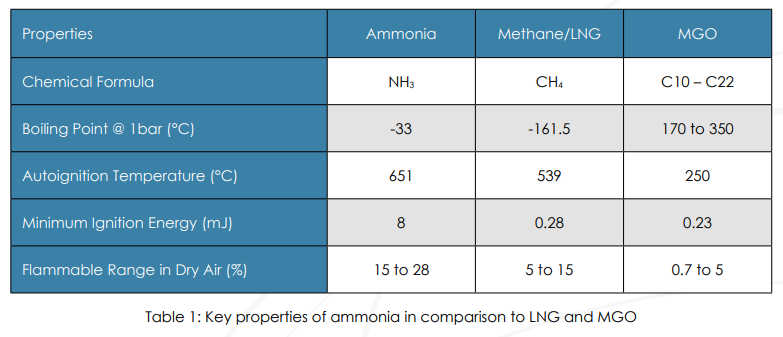The Maritime Technologies Forum (MTF) has released a report providing recommendations on how to develop and implement a Safety Management System (SMS) for ammonia-fuelled ships.
As explained in the report “Guidelines for developing and implementing a safety management system for ammonia-fuelled ships”, recognizing the industry’s forecasts on the uptake of future fuels with low to zero carbon emissions, ammonia has emerged as one frontrunner. However, it presents new risks such as toxicity and corrosiveness.
Ammonia has the advantage of containing no carbon in its molecule, unlike LNG or MGO, which means its combustion does not produce carbon dioxide. However, ammonia combustion results in other exhaust emissions such as nitrogen oxides, a local pollutant, and nitrous oxide, a greenhouse gas.

Additionally, ammonia can have unstable combustion, and current ammonia-fuelled engine designs require pilot fuel to provide the ignition energy. As a result, ammonia as fuel is unlikely to be combusted without a pilot fuel. In terms of storage, LNG must be kept at cryogenic conditions of –161.5°C, whereas liquid ammonia can be stored at –33°C, making its storage less energy-intensive.
To address these challenges, MTF has developed guidelines to close previously identified gaps when implementing the ISM code for safe operation with ammonia as fuel.
Key highlights of the report:
- Guidelines for SMS Development: Industry stakeholders can use the report’s guidelines and recommendations to develop new Safety Management Systems (SMS) or strengthen existing ones for ammonia as fuel. MTF recommends using these guidelines alongside other existing and upcoming guidelines to ensure safe application.
- Limited Initial Experience: The report acknowledges the elevated operational and environmental risks of using ammonia compared to fossil fuels and that the lack of operational experience and equipment operating with ammonia as a fuel limits the availability of data. A centralized industry database is recommended to share lessons learned from ammonia pilot projects and incident reports.
- Learning from Hazardous Occurrences and Accidents: The application of structured risk management within the SMS is crucial. Companies should proactively identify improvements through learning from non-conformities, accidents, and hazardous occurrences related to ammonia as fuel.
- Versatile SMS for Mixed Fuel Operations: In the initial stages, the fuel mix onboard will likely include both fossil fuels and ammonia. Safe fuel changeover procedures and comprehensive dual-fuel engine training programs are essential.
- Training and Familiarization: Ensuring safe ammonia-fuelled operations requires careful evaluation of competency, training, familiarization, and resources. The required level of competence should be determined by the role, task, or responsibility assigned.
- Human Factors Considerations: The report emphasizes the importance of understanding ammonia-related risks associated with human factors. Appropriate processes and procedures should be implemented to enhance the overall SMS.
SMS should learn from hazardous occurrences and accidents with ammonia as fuel
The application of a structured risk management within the SMS would be beneficial to strengthen the system in managing anticipated risks, including risks from the deployment of ammonia as fuel. The strength of the company’s SMS should be in the ability to proactively identify improvements in the SMS through learning from non-conformities, accidents, and hazardous occurrences (including near misses) related to ammonia as fuel and facilitate the closing of the gaps. Furthermore, and until operational experience is gained within each organisation, the SMS can be improved based on learnings from additional sources of information, including risk evaluations from the design or retrofit stage, learnings from other companies or pilot projects.
SMS should be versatile to accommodate mixed fuel operations
In the initial stages, as the fuel mix onboard likely includes both fossil fuels and ammonia (including pilot fuel), it is essential to implement safe fuel changeover procedures and provide comprehensive dual-fuel engine training programs to ensure safe operations. As such, the SMS should be versatile enough to meet various fuel scenarios, as ammonia as fuel is progressively scaled, eventually becoming mainstream.
Training and familiarisation are critical to ensure safe operations with ammonia as fuel
To ensure safe ammonia-fuelled operations, careful consideration needs to be given to the evaluation of the competency, training, familiarisation, and resources relevant to ammonia as fuel. The required level of competence, training, and upskilling should be determined by the role, task, or responsibility assigned to a person.
Human factors considerations and addressing associated risks to enhance SMS
The human factors in the operations associated with the handling, storage, and utilisation of ammonia are critical and should be considered to ensure safe operations. Due to ammonia’s novelty as a fuel in the maritime industry, it is critical that the various ammonia-related risks associated with human factors are understood so that appropriate processes and procedures are put in place to enhance the overall SMS.
By addressing the unique challenges and specific risks associated with ammonia as a marine fuel, we aim to support the transition towards sustainable shipping while upholding the stringent safety standards in ship operations.
…said Teo Eng Dih, Chief Executive, Maritime and Port Authority of Singapore (MPA).
































































